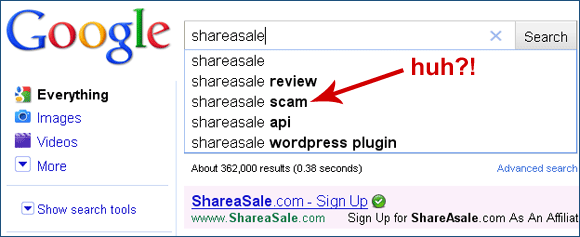I’ve spotted this story yesterday morning in a Russian online newspaper, but couldn’t find it anywhere on the English-speaking web then. Had to wait until later in the day to see it published by AFP, and picked up by a number of other news channels including Bloomberg, Reuters, CNN, and others.
The essence of the situation was such that a French “man convicted of a three year suspended jail sentence for corruption of a minor claimed that when one Googled his name, the terms ‘rapist’ and ‘satanist’ came up in Google’s Suggest feature” [source] and sued Google over it, stating that he has already paid in full for his crimes, and shouldn’t have this happening to him after he has already served prison time.
Google, in its turn, stated that the Google Suggest function merely “reflected the most common terms used in the past with words entered, so it was not Google itself that was making the suggestions” [source] and said they plan to appeal the French “court decision ordering the company to pay 5,000 euros ($6,750) in damages to a convicted sex offender” [source].
Very interesting situation; and I truly have mixed feelings about this one. On the one hand, a convicted criminal suing a search engine over a mechanism that simply refers to the resonance the former has created in the society, sounds close to insane. How could you “defame” this person any more than they have already defamed themselves? That oxymoron #1.
On the other hand, however, you may remember my last Saturday’s post where upon playing with a tool called Web Seer, I concluded that some of the results were “interesting, others — logical, and some — rather surprising”. What exactly did I mean by the latter? Well, look at the 3rd “suggestion” for ShareASale below:

“Scam”? Per Webster’s dictionary, that word stands for “a fraudulent or deceptive act or operation” [source]. Per my yesterday’s list of abbreviations, all these reviews, and my personal 6-years-long experience with this affiliate network it is it is one of the most ethical affiliate networks around (“known for its stance against parasites, its strive for transparency, and strong affiliate support”). How in the world do they have “scam” as a keyword in the third most popular word combination involving ShareASale? We know the answer from Google’s words quoted above (the function reflects “the most common terms used in the past with words entered”). To say the least, this is surprising. To say it as it is: if there is something that must be removed from the suggestions it is this word combination. It itself is oxymoron #2 (of the day).
Before I sign-up anywhere, I do searches for [insert your brand/product here] + “scam”, “sucks”, … and click on the results. That’s a common practice. Google’s suggest thingy is kinda self learning machine feeded by the query engine –to some extent–, as well as by anchor text and on-page factors, so the “scam” suggestion is logical.
I thought of that too. Thanks for that comment, Sebastian.